What I Did on My Summer Vacation II
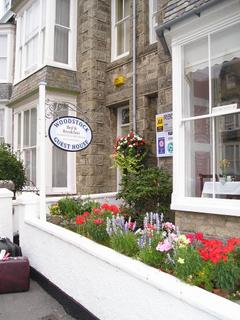 We woke up in Penzance Thursday morning, ready to spend the day driving back to London, where we had reservations in Bloomsbury for the remainder of the vacation. First, of course, we had the traditional B&B breakfast, which consists of a continental breakfast followed by a full English breakfast, except that a full English breakfast includes baked beans, and, well, if you've had baked beans for breakfast even once, then you understand how they lost the empire. (I must confess that, despite having lived in Boston for eleven years, I have never developed much of a taste for baked beans, unless I get to make them myself, in which case I put in enough unusual ingredients -- principally a good deal of sausage -- so that they bear only a passing resemblance to standard baked beans. The ones on the English breakfast table are straight out of a tin.) The large breakfast meant, naturally, that I was stuffed when we set out for London, which made it a good deal easier to sleep through most of V.'s driving, thus maintaining what's left of what passes for my sanity.
We woke up in Penzance Thursday morning, ready to spend the day driving back to London, where we had reservations in Bloomsbury for the remainder of the vacation. First, of course, we had the traditional B&B breakfast, which consists of a continental breakfast followed by a full English breakfast, except that a full English breakfast includes baked beans, and, well, if you've had baked beans for breakfast even once, then you understand how they lost the empire. (I must confess that, despite having lived in Boston for eleven years, I have never developed much of a taste for baked beans, unless I get to make them myself, in which case I put in enough unusual ingredients -- principally a good deal of sausage -- so that they bear only a passing resemblance to standard baked beans. The ones on the English breakfast table are straight out of a tin.) The large breakfast meant, naturally, that I was stuffed when we set out for London, which made it a good deal easier to sleep through most of V.'s driving, thus maintaining what's left of what passes for my sanity.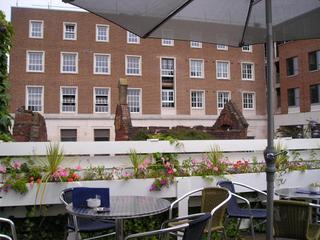 Our first major stop of the day was Exeter, where V. wanted to see the cathedral, and I wanted to hunt down some more band-aids. My feet were feeling a good deal better, but I was taking no chances. (Hint for Americans abroad: the Brits call band-aids "plasters.") The cathedral in Exeter is, indeed, very impressive. You can't take pictures inside unless you pay a pound for a photo license, so I didn't bother. It looks a lot like the inside of any very impressive European cathedral, except that it has somewhat less stained glass, so it's a bit brighter. V. speculated that the relative (and, indeed, it was only relative) paucity of stained glass might be due to other stained glass having been destroyed during the war, when Exeter was very heavily bombed. Not much aside from the cathedral was spared, and some small parts of the cathedral were destroyed, so it seems reasonable to believe that a good deal of stained glass was blown out and then replaced with something less busy. Apparently (i.e., I heard it from V. who would know and who is not good enough at lying to have just made it up for my benefit), Exeter was bombed by the Germans in retaliation for allied bombing of some German city, perhaps (but more likely not; V. knew the actual city and told me, but I forgot within three minutes) Dresden, which was bombed in retaliation for something else. I really had no idea that WWII had had so much of a tit-for-tat nature. I had just figured that one side bombed the other out of generalized hostility or to eliminate a position of strategic importance to the bombee, but no. I'm still not sure the whole idea of targeted revenge bombings makes sense to me. Is it supposed to stop the other side from bombing you? I mean, you're at war, right? Is there some sort of gentleman's agreement to not hit the other guy more than 10% harder than he hit you? I mentioned some of these thoughts to V. while we were on the grounds outside the cathedral, but he just rolled his eyes at my ignorance of history, and then he said something very like "those who do not learn the lessons of history are doomed to repeat them," an aphorism that always drives me nuts. I mean, sure, there's an element of truth to it. From some of the history I heard while I was in England (and before), I have learned that it is decidedly unwise to either bomb Dresden or marry a British monarch, but -- without the benefits of history -- which of those actions was I really likely to take? Both perhaps, in which case, I suppose that I should be very grateful for having dodged those bullets. Thank you, history!
Our first major stop of the day was Exeter, where V. wanted to see the cathedral, and I wanted to hunt down some more band-aids. My feet were feeling a good deal better, but I was taking no chances. (Hint for Americans abroad: the Brits call band-aids "plasters.") The cathedral in Exeter is, indeed, very impressive. You can't take pictures inside unless you pay a pound for a photo license, so I didn't bother. It looks a lot like the inside of any very impressive European cathedral, except that it has somewhat less stained glass, so it's a bit brighter. V. speculated that the relative (and, indeed, it was only relative) paucity of stained glass might be due to other stained glass having been destroyed during the war, when Exeter was very heavily bombed. Not much aside from the cathedral was spared, and some small parts of the cathedral were destroyed, so it seems reasonable to believe that a good deal of stained glass was blown out and then replaced with something less busy. Apparently (i.e., I heard it from V. who would know and who is not good enough at lying to have just made it up for my benefit), Exeter was bombed by the Germans in retaliation for allied bombing of some German city, perhaps (but more likely not; V. knew the actual city and told me, but I forgot within three minutes) Dresden, which was bombed in retaliation for something else. I really had no idea that WWII had had so much of a tit-for-tat nature. I had just figured that one side bombed the other out of generalized hostility or to eliminate a position of strategic importance to the bombee, but no. I'm still not sure the whole idea of targeted revenge bombings makes sense to me. Is it supposed to stop the other side from bombing you? I mean, you're at war, right? Is there some sort of gentleman's agreement to not hit the other guy more than 10% harder than he hit you? I mentioned some of these thoughts to V. while we were on the grounds outside the cathedral, but he just rolled his eyes at my ignorance of history, and then he said something very like "those who do not learn the lessons of history are doomed to repeat them," an aphorism that always drives me nuts. I mean, sure, there's an element of truth to it. From some of the history I heard while I was in England (and before), I have learned that it is decidedly unwise to either bomb Dresden or marry a British monarch, but -- without the benefits of history -- which of those actions was I really likely to take? Both perhaps, in which case, I suppose that I should be very grateful for having dodged those bullets. Thank you, history! 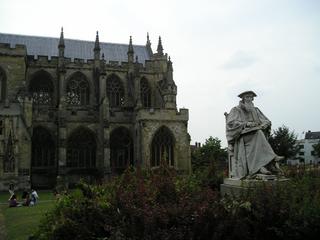 Back to the cathedral, I was somewhat fascinated by the choir seats and the large pipe organ, but once I'd figured out where the very old, very narrow spiral staircase (it looked like something you'd expect to find in the library in The Name of the Rose) that took the organist up to the console was, I had seen enough, especially since there was then a vicar who came in to lead a prayer, and the prayer was all about self-denial and ignoring your baser urges and similar sorts of what not. At least she didn't hit me up for money.
Back to the cathedral, I was somewhat fascinated by the choir seats and the large pipe organ, but once I'd figured out where the very old, very narrow spiral staircase (it looked like something you'd expect to find in the library in The Name of the Rose) that took the organist up to the console was, I had seen enough, especially since there was then a vicar who came in to lead a prayer, and the prayer was all about self-denial and ignoring your baser urges and similar sorts of what not. At least she didn't hit me up for money.There was a good deal of traffic on the way back to Heathrow, where we had to drop the rental car. A shuttle took us back to the terminal, where we caught the tube, which, a while later, dropped us at the Russell Square stop. It had been bombed in the main bombings in July, but you would not have known it from looking at it. A number of people have asked me, since I've returned, whether London was different because of the bombings, and it's a difficult question to answer since I had never visited it before the bombings, but to me, the most noticeable difference was that whenever you were on the tube, you'd hear an announcement to the effect that you needed to make sure to keep your belongings with you at all times because if they found your stuff unattended, they would take it away and destroy it. There were also a few police officers at some of the underground entrances, but that was about it. The city did not seem unduly preoccupied with security, and I certainly never had any reason to worry.
We stayed at the Bonnington, a large and wholly unremarkable hotel a block or so south of Russell Square. By the time we were checked in and had dropped off our bags, it was fairly late, so we had dinner (an Italian restaurant down the block; V. was feeling a bit tired of English food) and retired for the evening.
Friday was mainly a museum day for us, and that was a good thing in that it rained most of the day. It also rained on Monday morning, when we were headed to the airport, but other than that, we had splendid weather throughout our stay in England, though the weather in London was never anything like as glorious as the weather in Cornwall. In fact, if there was any problem with London, it's that it wasn't Cornwall, which is so beautiful that it's tough to beat. Of course, city pleasures are different from countryside pleasures, and London does not lack for things to do.
The visit to London lacked the obvious organization and linear nature of our Cornwall walking tour, so let me just run down a few of the highlights for you.
As You Like It. Note to Americans traveling to England. When you show your ticket to the usher, and he tells you that you're in "the stalls," there is no need to fear being made to stand on hay in close quarters with farm animals; it just means that you have an orchestra-level seat. I didn't go to Stratford-on-Avon, and I only walked quickly past the Globe theatre while I was in England, but I did see an exceedingly charming production of one of my favorite comedies. Honestly, Shakespeare in England, what's not to like? (Ok, so V. didn't like it. He says that he doesn't like Shakespeare because he can't understand all the dialog. This is a person who willingly submits himself to Wagner on a regular basis. If watching the Gods all perish in fire is your idea of a good time [sorry if I just spoiled Gotterdamerung for anyone, but you're probably better off], you might want to skip As You Like It.) I wish I could have seen it twice.
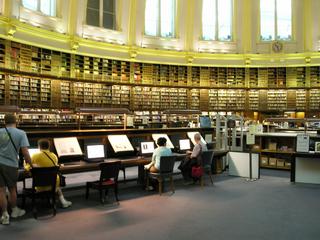 British Museum, Tate Modern, Tate English. The Elgin Marbles are pretty much everything they're cracked up to be. Trying to see the Rosetta Stone is a lot like trying to see the Mona Lisa at the Louvre. Be prepared to elbow your way through hordes of tourists who came to have their picture taken in front of something famous. Honestly, these people would save themselves a lot of money if they'd just pull a picture off the Internet and learn to use Photoshop. The Assyrian and Egyptian sculptures are also hella cool. The Tates are a bit of a hike from the Underground, but well worth the trip, though after about 2.5 hours in each, I was suffering from a bit of art glut. The Millennium Bridge is just outside the Tate Modern. It's an especially nice footbridge over the Thames, built for the millennium. No one said specifically, but the construction materials indicate that it was probably the most recent millennium, rather than the one back in 1000 (or 1001, if you prefer; I'm not stepping into that argument). If you walk across it, you'll find yourself at St. Paul's.
British Museum, Tate Modern, Tate English. The Elgin Marbles are pretty much everything they're cracked up to be. Trying to see the Rosetta Stone is a lot like trying to see the Mona Lisa at the Louvre. Be prepared to elbow your way through hordes of tourists who came to have their picture taken in front of something famous. Honestly, these people would save themselves a lot of money if they'd just pull a picture off the Internet and learn to use Photoshop. The Assyrian and Egyptian sculptures are also hella cool. The Tates are a bit of a hike from the Underground, but well worth the trip, though after about 2.5 hours in each, I was suffering from a bit of art glut. The Millennium Bridge is just outside the Tate Modern. It's an especially nice footbridge over the Thames, built for the millennium. No one said specifically, but the construction materials indicate that it was probably the most recent millennium, rather than the one back in 1000 (or 1001, if you prefer; I'm not stepping into that argument). If you walk across it, you'll find yourself at St. Paul's.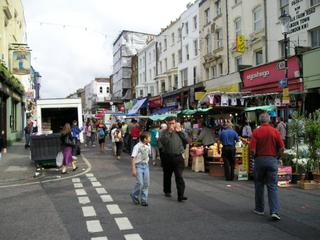 Portobello Market. The top item on my list for London was a walk through this lengthy street market. The guidebooks will tell you to get there around 8 on Saturday morning, when it opens, but at 10, people are still setting up in the flea market portion at the end of the market. I was tempted by some botanical engravings of fruit in the antique section of the market, but 30 pounds seemed a bit much to pay for one page, and 6 pounds seemed a bit much to pay for a reproduction.
Portobello Market. The top item on my list for London was a walk through this lengthy street market. The guidebooks will tell you to get there around 8 on Saturday morning, when it opens, but at 10, people are still setting up in the flea market portion at the end of the market. I was tempted by some botanical engravings of fruit in the antique section of the market, but 30 pounds seemed a bit much to pay for one page, and 6 pounds seemed a bit much to pay for a reproduction. 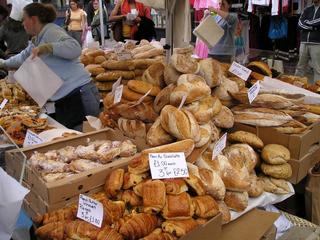 I did, however, score a pretty good almond croissant down in the food section. The food generally was overpriced (Feta cheese, for example, went for fourteen pounds for a kilo, which is about $11.50 a pound. For feta. Olives were similarly expensive.), but there were vendors with good prices on breads and fish. I did not buy any fish, but I did at least get to see what a plaice looks like in its unprocessed form.
I did, however, score a pretty good almond croissant down in the food section. The food generally was overpriced (Feta cheese, for example, went for fourteen pounds for a kilo, which is about $11.50 a pound. For feta. Olives were similarly expensive.), but there were vendors with good prices on breads and fish. I did not buy any fish, but I did at least get to see what a plaice looks like in its unprocessed form. 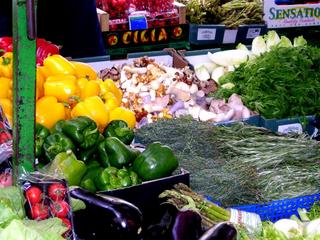 I also didn't see any portobellos, but there was at least one vendor selling some mushrooms that I did not, however, recognize. All mushrooms are, of course, mood enhancers, but I couldn't help wondering whether these were particularly so. Towards the very beginning of the market is a building upon which hangs a sign informing passersby that fly pitching is strictly forbidden. I have no idea what exactly fly pitching entails, but, as I was not arrested, I presume that I did not engage in it.
I also didn't see any portobellos, but there was at least one vendor selling some mushrooms that I did not, however, recognize. All mushrooms are, of course, mood enhancers, but I couldn't help wondering whether these were particularly so. Towards the very beginning of the market is a building upon which hangs a sign informing passersby that fly pitching is strictly forbidden. I have no idea what exactly fly pitching entails, but, as I was not arrested, I presume that I did not engage in it.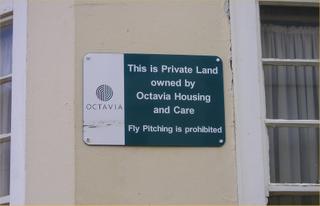
(Speaking of not being arrested, should I be insulted that security personnel never seem to give me any scrutiny whatsoever? V. got pulled aside for special hand searching and x-raying [he claims that the guard didn't even want his phone number, but I wonder] twice, and when I grumbled about no one ever wanting to pat me down, he said that if it were to happen to me, the guard would likely be a woman. He's right, of course: it would be a former East German soprano who's still pissed off that she never got to sing Brunhilde because that SOB artistic director to whom I bear a strong resemblance thought that she was too masculine. Yikes.)
Indian food. V. wanted to go down to Soho on Saturday night to check out the gay bar district, and I reluctantly agreed, on the condition that I got to pick out the restaurant. When we got there, it was during the evening theatrical performances, so the restaurants were pretty empty, and the proprietor of one of the Indian restaurants came out to the street to pitch his fixed price menu. Mmmm. I had somehow never before realized how good the spicy pickled lime can be (in small quantities), and that was just the beginning. I had a very good chicken sag for the entree. I found the rest of Soho something of a disappointment. There were a number of people out working the street offering to show us the way to one or more of the gay clubs. In my experience, it's really not that difficult to look at a club and figure out whether it's a gay club (they tend to be the ones full of gay men), so I thanked them but told them no.
Hyde Park. Sunday was an especially nice day, and since I felt like I hadn't really gotten an overview of London, we decided to take a bus tour on the top of one of the double-decker buses. The guide was a very entertaining young woman, just out of college, and I got to see all the sights that one is supposed to see in London (and that can be seen from a bus, of course) and heard any number of stories (many of which I suspect were apocryphal) about historical and contemporary residents of London. Also, I saw the front of Sean Connery's house. When the tour was done, what I most wanted to do was to walk through Hyde Park (I called it "Central Park," just to annoy V.; I never said I was a good person). We started off at Speakers Corner, which I found disappointing. There were a number of people who were speaking in quite agitated tones, but none of them were speaking in a language that I know, and I am pretty sure that all of the speech was political. There should have been somewhat shouting out a rant about the terrible, terrible mistake that is mushy peas. Still, Hyde Park is a beautiful place to walk through on a sunny August day, and one sees any number of handsome young men who have left their shirts behind.
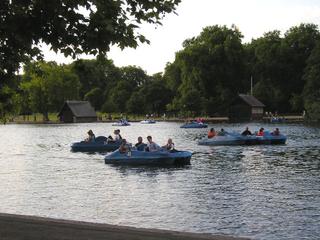 We walked down to the Serpentine, where we got ice cream, and then walked some more. At this point, we had been walking, off and on, all day, so I found a park bench and sat and watched the many people pedaling boats on the lake. V. quickly tired of doing nothing, so I told him to walk around for a bit while I relaxed. Half an hour later, he came back, and took me to see the memorial for Diana. I was never especially caught up in the Diana fuss, either as a supporter or a detractor, but I will say that the sort of extended fountain that they installed in her memory is extremely pleasant, as is walking around it and seeing all the children with their feet in the water.
We walked down to the Serpentine, where we got ice cream, and then walked some more. At this point, we had been walking, off and on, all day, so I found a park bench and sat and watched the many people pedaling boats on the lake. V. quickly tired of doing nothing, so I told him to walk around for a bit while I relaxed. Half an hour later, he came back, and took me to see the memorial for Diana. I was never especially caught up in the Diana fuss, either as a supporter or a detractor, but I will say that the sort of extended fountain that they installed in her memory is extremely pleasant, as is walking around it and seeing all the children with their feet in the water.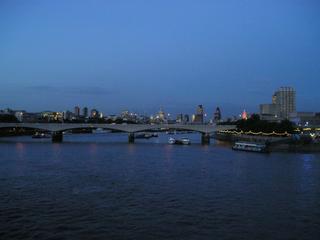 South bank of the Thames. On our last night in London (Sunday), we took the Underground down to the north bank, walked across, and then walked along the river from Westminster Bridge to the Millennium Bridge. No place like it on a summer night: street musicians, cafes, and terrific views of the city. It was a great way to end a great vacation. Anyone who hasn't been to England should go there, and perhaps sooner than later. If there was anything that made me uneasy about my trip there, it was how little I felt like I was in a foreign country. Yes, there are linguistic and other differences, but the differences between the DC area and London are perhaps not greater than the differences between, say, Dallas and Boston. Or if they are, I got the feeling that they might not be for that much longer. Already in London, you cannot escape either McDonald's or Starbucks. Globalization is probably not something that can be stopped, and a lot of people don't want to stop it, but it will be strange if one of its by-products is that no matter where you go, here you are.
South bank of the Thames. On our last night in London (Sunday), we took the Underground down to the north bank, walked across, and then walked along the river from Westminster Bridge to the Millennium Bridge. No place like it on a summer night: street musicians, cafes, and terrific views of the city. It was a great way to end a great vacation. Anyone who hasn't been to England should go there, and perhaps sooner than later. If there was anything that made me uneasy about my trip there, it was how little I felt like I was in a foreign country. Yes, there are linguistic and other differences, but the differences between the DC area and London are perhaps not greater than the differences between, say, Dallas and Boston. Or if they are, I got the feeling that they might not be for that much longer. Already in London, you cannot escape either McDonald's or Starbucks. Globalization is probably not something that can be stopped, and a lot of people don't want to stop it, but it will be strange if one of its by-products is that no matter where you go, here you are.

3 Comments:
The globalization thing is too true. When I went to England with my parents as a little girl, it was so very different.
You could have been dropped into the middle of London, or any small town, and you would have known you were in a different country.
The people dressed differently, the shops were different; it even smelled different.(I thought at one time I had the smell pinned down; it was coal tar soap. Turns out it was a bit more complex.)
So heed the call, folks. See the world while it is still varied and fascinating!
PSOops,wrong button. No wish to be anonymous. Sorry.
England generally is a lot more expensive than the U.S., but London is probably not any more expensive than New York. And it's a lot like New York in terms of things to do. London is more relaxed and genial, but New York has much better bagels, of course.
Post a Comment
<< Home